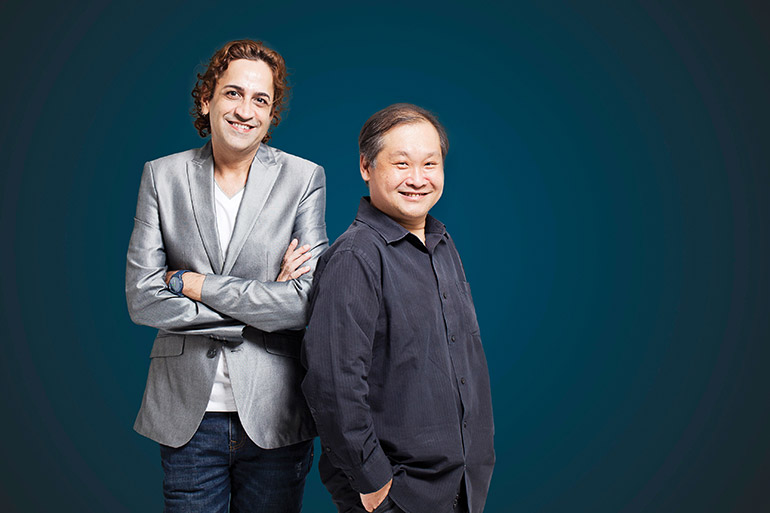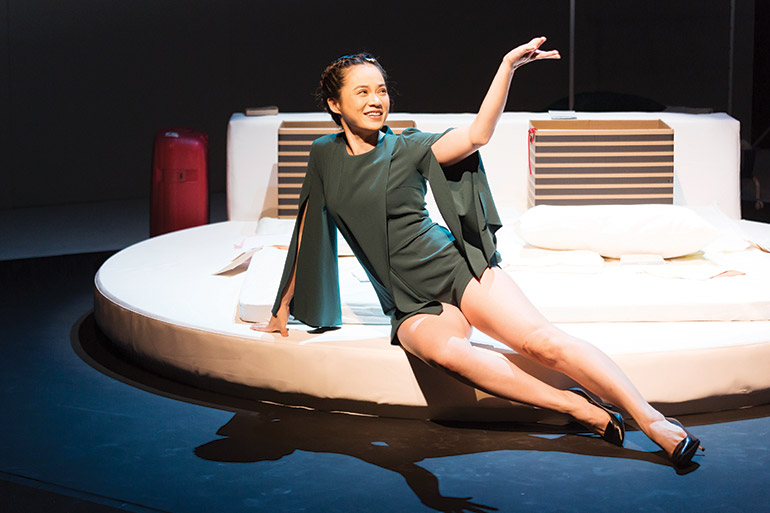The lights go down and the actors walk on stage, transforming into familiar figures – teachers, administrators, students – with mannerisms, cadence and a liberal use of ‘Singlish’ that offers a reflection of their audience.
The first words that explode out of a teenage actor’s mouth is a string of Hokkien curses. “Work so hard! Rehearse so hard! And you, Jali! Cannot even remember your lines. Damn screw up the show,” he berates his classmates.
A group of high school students in the audience snigger: “Eh, last time my class also got like that, leh!” a boy whispers to his friends in the same accent coming from the cast onstage.
The play, Those Who Can’t, Teach, is being re-staged by the Necessary Stage (TNS) as part of the theatre company’s 30th anniversary line-up. It’s a classic TNS production: a character-driven story that places ‘Singaporean-ness’ front and centre, with all its quirks and complexities.
But there is no easy way to tell Singapore’s story, as TNS has shown since artistic director Alvin Tan started the company.
“TNS tackles difficult issues and keeps demonstrating that theatre is a public space for discourse, and that people can participate in discourse with deep emotion and intellectual rigour,” said Kok Heng Leun, artistic director of the Drama Box theatre company.
The city-state is both impressive in some aspects and repressive in others: it has a world-class urban infrastructure yet remains stubbornly conservative on social issues. High levels of internet and mobile penetration ensure a well-connected populace, yet the government continues to wield broad laws regulating speech and expression while requiring artists to submit their work for vetting. “It’s so complex,” Tan told Southeast Asia Globe. “If you can capture that, it’s Singapore.”

TNS was founded in an era when theatre was viewed with suspicion by the state. Two theatre practitioners from the company Third Stage were detained without trial for over a year in 1987 alongside activists and social workers, accused of participating in a “Marxist Conspiracy” to overthrow the government. In 1994, TNS came under suspicion after it was reported that Tan and resident playwright Haresh Sharma had attended a workshop run by a Brazilian Marxist theatre practitioner. “Their conclusion was that we were not Marxists, we were idealists,” Tan said.
They also ran into problems with their 1993 play, Off Centre. The project was commissioned by the Ministry of Health to examine mental illness. The creative team interviewed patients and social workers and came up with a play that explored schizophrenia and depression in Singapore. The ministry didn’t take kindly to the script, criticising it for not putting “across the message that the ministry had in mind”. When the company refused to make changes, the government withdrew its funding. TNS staged the play anyway.
Things seemed to change in 2006, when Off Centre became the first Singaporean play to be included in the local literature curriculum. Tan and Sharma, too, have gone from subjects of investigation to recognition, each receiving the Cultural Medallion – the highest honour for the arts – in 2014 and 2015.
It serves the state purpose to celebrate certain aspects of the kind of things we do… because you can then allow a semblance of discourse and freedom”
One might interpret this as evidence of Singapore’s liberalisation, but the reality isn’t such a neat trajectory. The Cultural Medallion might be a show of recognition, but it doesn’t necessarily mean an end to conflict with the state, as winners must continue working around state regulations.
“As the scene develops you have to see that the Cultural Medallion is not just for people who are safe artists who will only exist in a certain kind of silo and never be controversial,” said Sharma.
This back-and-forth comes down to the way the political establishment views the arts as a double-edged sword: while it can be used to boost Singapore’s international image, the authorities continue to be wary of the arts as a space for political critique and dissent.
“It’s about how art has been instrumentalised,” said TNS general manager Melissa Lim. “It serves the state purpose to celebrate certain aspects of the kind of things we do… because you can then allow a semblance of discourse and freedom.”
There’s also more to Singaporean theatre than politics. As a society marked by diversity, portraying Singapore with any degree of authenticity requires diving into issues such as race, culture, language and class.
In TNS’ early years, theatre – still influenced by British colonial history – was seen as a form that required the Queen’s English. “If we used Singlish, people laughed,” Tan recalled. “They said: ‘This is not acting. This is how we speak.’”
But that attitude is largely history. “We’re all Singaporeans, we all come from different backgrounds, but we might have issues that are similar – only language is stopping us,” said actor Siti Khalijah Zainal, who has appeared in many TNS productions. “For TNS to allow all these colourful languages to be onstage makes everyone feel very included.”

TNS’ preoccupation with language and culture also allows them to not only cast a critical eye on top-down policies, but stage plays that touch on embedded social norms and practices. In Best Of, a critically-acclaimed monologue that has been restaged multiple times, a young Malay woman talks candidly to the audience about her day, from visiting her cousin in prison to the difficulties of dealing with her divorce as a Muslim woman. This year’s Actor, Forty, examined gender politics through an actress reflecting upon her career.
“We’re not only state-obsessed, because we’re also looking at how to disturb what has been normalised in the citizens,” said Tan. “The works always try to implicate the audience, so it’s not just always ‘the state is at fault’.”
This dynamic has meant that efforts to police their plays don’t always originate with the state, but instead a conflict with their audience, Singaporeans. Two shows were withdrawn from the M1 Singapore Fringe Festival late last year after complaints about nudity and explicit content sprung up on ‘Singaporeans Defending Family and Marriage’, a conservative Christian Facebook page. The authorities ruled that the productions had “excessive nudity” and would have to be altered. As organisers, TNS decided to remove them from the line-up instead.
“Sometimes you feel like, if their intention is to eat at you and to bring you down, then it’s working. It’s like there’s a constant reminder; we’re watching you, we’re coming for you, anyone who’s different,” said Sharma.
Support for artistic freedom is, for now, lacking from those in positions of power. “The allies [should] also be people in positions of power in the government,” Sharma added. “At some point they should just say: ‘I’m going to go with the artist. I know you have a problem with that vulgarity, but I’m going to go with the artist.’ It never happens. Never.”


